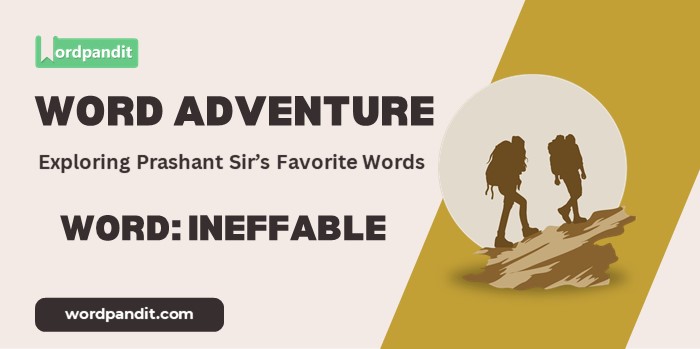Word Adventure: Ineffable
The Headline
"Ineffable: When Words Fail, But Meaning Doesn't"
The Scoop
In the vast ocean of language, some concepts are like the deepest trenches – mysterious, awe-inspiring, and beyond our ability to fully capture. 'Ineffable' is a word that points to these depths, acknowledging the limits of language while paradoxically giving voice to the unspeakable. Let's dive into this fascinating term that dares to name the unnameable!
Let's Break It Down
The Plot Thickens
'Ineffable' comes to us from Latin, where it literally meant "not speakable". It entered the English language in the 14th century, often used in religious contexts to describe the indescribable nature of the divine.
Over time, its usage broadened to encompass any experience or concept that defies description. From the overwhelming beauty of a sunset to the depth of human emotions, 'ineffable' gives us a way to acknowledge that some things are beyond words.
Interestingly, 'ineffable' is part of a class of words known as auto-antonyms or contranyms – words that can contradict themselves. By using a word to describe something as indescribable, we're engaging in a fascinating linguistic paradox!
Word in the Wild
The Twist
Here's an intriguing aspect of 'ineffable': while it's often associated with positive experiences (ineffable joy, ineffable beauty), it can also describe things too horrible to put into words. This dual nature reflects the full spectrum of human experience – from the sublimely beautiful to the unspeakably terrible. It's a linguistic reminder that the most profound aspects of life, whether wonderful or dreadful, often leave us speechless.
Make It Stick
Ineffable: When silence speaks louder than words!
Your Turn
Think about a time when you experienced something ineffable. How did you try to communicate or remember that experience? Share your encounters with the indescribable in the comments below. Let's explore those moments that push the boundaries of language and leave us in awe!
Down the Rabbit Hole
- Curious about other words that describe the indescribable? Look into terms like 'ineffable's' cousins 'indescribable', 'unutterable', or 'inexpressible'.
- Interested in the philosophy of language and its limits? Explore Ludwig Wittgenstein's ideas about language and reality.
- Want to dive into the world of paradoxical language? Research oxymorons, contranyms, and other linguistic curiosities that challenge our understanding of meaning.
The Last Word
As we conclude our exploration of 'ineffable', I hope you've gained a new appreciation for this word that dares to name the unnameable. It reminds us that language, for all its power, is a tool that sometimes falls short in the face of our most profound experiences. The next time you find yourself at a loss for words, overwhelmed by beauty, wonder, or even despair, remember – you're not just speechless, you're encountering the ineffable! Until our next word adventure, this is Prashant from Wordpandit, encouraging you to embrace those ineffable moments that remind us of the vast depths of human experience!










